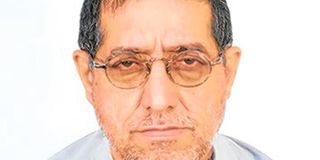THINKING ALOUD: After a brief lull: is grand corruption reemerging?

Prof Zulfiqarali Premji
What you need to know:
- When President John Magufuli took office on November 5, 2015, he made surprise visits to the central bank (BoT), Muhimbili National Hospital (MNH), Tanzania Ports Authority (TPA), etc. and proactively condemned grand corruption – and, for the first time in the history of this nation, people felt that corruption had finally been contained.
The 2017 report by the non-partisan pan-African research network Afrobarometer concluded that anti-corruption efforts in Tanzania have paid dividends. However, citizen-engagement is still essential to sustain the anti-graft measures. When President John Magufuli took office on November 5, 2015, he made surprise visits to the central bank (BoT), Muhimbili National Hospital (MNH), Tanzania Ports Authority (TPA), etc. and proactively condemned grand corruption – and, for the first time in the history of this nation, people felt that corruption had finally been contained. There was a positive mood and people genuinely felt that better days were coming.
Indeed, Tanzania is developing largely under the visionary leadership of President Magufuli. Major development projects have started or are in the planning stages. Donors are coming forth. There is peace, tranquility and an air of optimism for a better future.
In these times of confidence and hope, however, corruption is re-emerging, and public harassment has been on the increase in the last six months or so.
Why? Maybe the initial momentum needs to be reinvigorated.
The initial anti-corruption measures did make a difference. These included – but were not limited to – public denunciations of corruption; shored-up law enforcement; increased judiciary budgets; expedited adjudication of corruption cases; high-profile arrests; petty corruption also targeted…
The intensified efforts against corruption resulted in the dip that was reported by the Afrobarometer survey.
Perhaps these intensified measures have reached an impasse – and there’s a dire need to revitalize them, including citizen engagement to sustain the anti-graft war… Otherwise, the realized gains will turn into losses. Let me illustrate this with an example.
There has been an increase in public revenue collections, and credit for this goes to the Tanzania Revenue Authority (TRA). But then again, there is corruption within TRA itself – if only because its officials still have the leverage to work in secrecy with unscrupulous taxpayers.
Corrupt TRA officers will retrieve accounts from, say, year-2010, find faults – and threaten court action, imprisonment, heavy fines... Then they will just as soon negotiate compromise on the back of a bribe, the starting amount being, for example, Sh200 million. Finally they will settle for Sh100 million: Sh50 million tax arrears, and Sh50 million for the TRA officers, paid under the table.
Where’re the police and the anti-corruption Bureau (PCCB) in this?
Harassment is another public complaint. Everywhere there are threats and intimidation, while admonishment and education are no longer imparted.
It’s trickling down, with corrupt wa-Jumbe wa Nyumba Kumi-Kumi (Ten-Cell Leaders) once in a while extorting bribes from households in their areas of jurisdiction.
A new gimmick is for corrupt JKT and Mgambo members to inspect household compounds and streets for cleanliness. Unclean areas should attract penalties. But, it is also a way of extorting money not only in classy residential areas like Upanga and the city centre in Dar es Salaam, but also in cholera-prone areas like Tandale, Mbagala and Sinza on the city’s suburbs. In these times of peace and tranquility when Tanzania isn’t at war, the Military and Paramilitary should also contribute to socio-economic development, supervising infrastructure construction, etc.
Fighting corruption is dangerous; but it’s necessary. To effectively fight the hydra-headed monster, we need a supportive coalition at all of government levels.
It’s important that the country’s top leaders support anti-corruption efforts – for which we need strong incorruptible systems and institutions for increased transparency, conducting objective evidence analyses, setting the rules of engagement, and penalising those who break the rules.
Essential institutions include a strong, transparent and non-corruptible judicial system; a technical system to manage money and thwart corruption, and a strong executive that supports anti-corruption work.
Citizen-engagement can start with the creation of a Citizens Bureau (CB) where Tanzanians can confidently lodge complaints, including naming individuals and institutions involved in corruption. In turn, the CB can disclose the complaints to the general public by, for example, publishing same in mass media organs.
Exposure of corruption via a public platform would have an additional positive impact. The CB can follow with PCCB the resolution of such complaints. The fight against corruption needs to be reactivated robustly, and new measures devised to ensure sustainability. Corruption is evil, and it’s the right time and environment to eradicate or significantly reduce it. It can be done if we all play our part.




